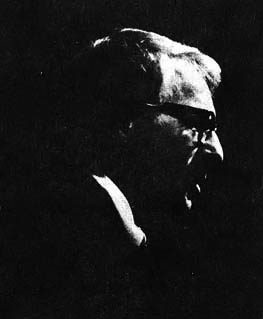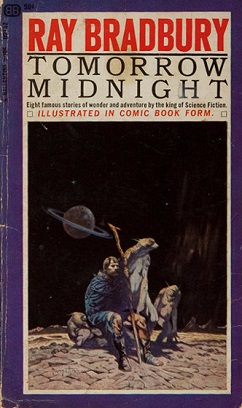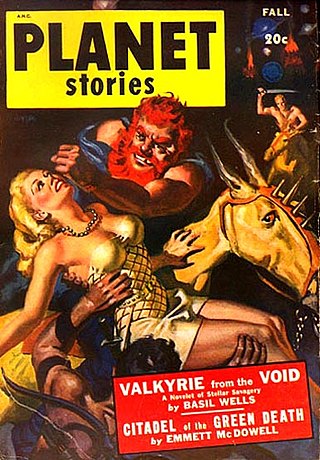Related Research Articles

Ray Douglas Bradbury was an American author and screenwriter. One of the most celebrated 20th-century American writers, he worked in a variety of genres, including fantasy, science fiction, horror, mystery, and realistic fiction.

The Martian Chronicles is a science fiction fix-up novel, published in 1950, by American writer Ray Bradbury that chronicles the exploration and settlement of Mars, the home of indigenous Martians, by Americans leaving a troubled Earth that is eventually devastated by nuclear war.

The Illustrated Man is a 1951 collection of 18 science fiction short stories by American writer Ray Bradbury. A recurring theme throughout the stories is the conflict of the cold mechanics of technology and the psychology of people. It was nominated for the International Fantasy Award in 1952.

William Francis Nolan was an American author who wrote hundreds of stories in the science fiction, fantasy, horror, and crime fiction genres.

X Minus One is an American half-hour science fiction radio drama series that was broadcast from April 24, 1955, to January 9, 1958, in various timeslots on NBC. Known for high production values in adapting stories from the leading American authors of the era, X Minus One has been described as one of the finest offerings of American radio drama and one of the best science fiction series in any medium.
"Here There Be Tygers" is a short story by American writer Ray Bradbury, originally published in the anthology New Tales of Space and Time in 1951. It was later collected in Bradbury's short story collections R is for Rocket and The Golden Apples of the Sun. It deals with a rocket expedition sent to a planet to see whether or not its natural resources can be harvested for the human race. They discover a paradise which seems to provide for them whatever they desire even as they think of it. They ultimately decide to leave the planet and report that it is hostile and of no benefit to humans.

The Golden Apples of the Sun is an anthology of 22 short stories by American writer Ray Bradbury. It was published by Doubleday & Company in 1953.

S is for Space (1966) is a collection of science fiction short stories written by Ray Bradbury. It was compiled for the Young Adult sections of libraries.
"The Long Rain" is a science fiction short story by American writer Ray Bradbury. This story was originally published in 1950 - under a different title indicative of its ending - in the magazine Planet Stories, and then in the collection The Illustrated Man. The story tells of four men who have crashed on Venus, where it is always raining.
"The Exiles" is a science fiction short story by Ray Bradbury. It was originally published as "The Mad Wizards of Mars" in Maclean's on September 15, 1949 and was reprinted, in revised form, the following year by The Magazine of Fantasy & Science Fiction. First collected in The Illustrated Man (1951), it was later included in the collections R Is for Rocket (1962), Bradbury Stories: 100 of His Most Celebrated Tales (2003), A Sound of Thunder and Other Stories (2005) and A Pleasure to Burn.

The Stories of Ray Bradbury is an anthology containing 100 short stories by American writer Ray Bradbury, first published by Knopf in 1980. The hundred stories, written from 1943 to 1980, were selected by the author himself. Bradbury's work had previously been collected in various compilations, such as The Martian Chronicles and The October Country, but never in such a large volume or spanning such a long period of time.
"There Will Come Soft Rains" is a science fiction short story by author Ray Bradbury, written as a chronicle about a lone house that stands intact in a California city that has otherwise been obliterated by a nuclear bomb, and then is destroyed in a fire caused by a windstorm. The title is from a 1918 poem of the same name by Sara Teasdale that was published during World War I and the Spanish flu pandemic. The story was first published in 1950 in two different versions in two separate publications, a one-page short story in Collier's magazine and a chapter of the fix-up novel The Martian Chronicles.

Bradbury Stories: 100 of His Most Celebrated Tales (2003) is a collection of short stories by Ray Bradbury. Bradbury wrote an introduction to the collection where he speaks about some of the inspirations, influences and among other things, the comedy duo Laurel and Hardy. The collection repeats no stories from The Stories of Ray Bradbury.
"Dark They Were, and Golden-Eyed" is a science fiction short story by American writer Ray Bradbury. It was originally published in the magazine Thrilling Wonder Stories in August 1949, under the title "The Naming of Names". It was subsequently included in the short-story collections A Medicine for Melancholy and S Is for Space.

The following is a list of works by Ray Bradbury.

The Autumn People is a mass-market paperback collection of comic adaptations of eight short horror and crime stories by Ray Bradbury, gathered from the pages of the EC Comics comic books of the 1950s. It is one of five EC collections published by Ballantine Books between 1964 and 1966, and one of two made up of comic adaptations of Bradbury's work. The presentation of the material is problematic at best, since the color comic book pages are represented in black and white and broken into horizontal strips to fit the mass-market paperback format. Still, the collections are historically important. They were the first attempt to resurrect the EC comics, only a decade after public outcry had driven them off the racks. They were the first introduction of those comics to a generation of readers too young to remember them in their first run.

Tomorrow Midnight is a mass-market paperback collection of comic adaptations of eight short science fiction stories by Ray Bradbury, gathered from the pages of the EC Comics comic books of the 1950s. It is one of five EC collections published by Ballantine Books between 1964 and 1966, and one of two made up of comic adaptations of Bradbury's work. The presentation of the material is problematic at best, since the color comic book pages are represented in black and white and broken into horizontal strips to fit the mass-market paperback format. Still, the collections are historically important. They were the first attempt to resurrect the EC comics, only a decade after public outcry had driven them off the racks. They were the first introduction of those comics to a generation of readers too young to remember them in their first run.

"Mars Is Heaven!" is a science fiction short story by American writer Ray Bradbury, originally published in 1948 in Planet Stories. "Mars Is Heaven!" was among the stories selected in 1970 by the Science Fiction Writers of America as one of the best science fiction short stories published before the creation of the Nebula Awards. As such, it was published in The Science Fiction Hall of Fame Volume One, 1929–1964. It also appears as the sixth chapter of The Martian Chronicles, revised as "The Third Expedition."
Come into My Cellar, alternatively titled Boys! Raise Giant Mushrooms in Your Cellar!, is a science fiction short story by American writer Ray Bradbury. It was originally published in Galaxy Magazine in October 1962, and was subsequently included in the short-story collection S is for Space.
"I, Rocket" is a science fiction short story by American writer Ray Bradbury, first published in the May 1944 issue of the science fiction magazine Amazing Stories. It focuses on the war experiences of a rocket ship built for combat, as told from the ship's point of view.
References
- ↑ Bradbury, Ray (2005). Bradbury Stories: 100 of His Most Celebrated Tales. Perennial. p. 24.
- ↑ Touponce, William F. (2004). Ray Bradbury: the life of fiction . Kent State University Press. pp. 460. ISBN 0-87338-779-1.
- ↑ von Ruff., Al. "Publication Listing". The Internet Speculative Fiction Database.